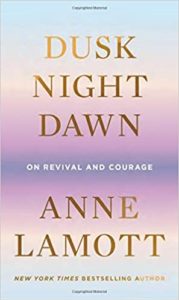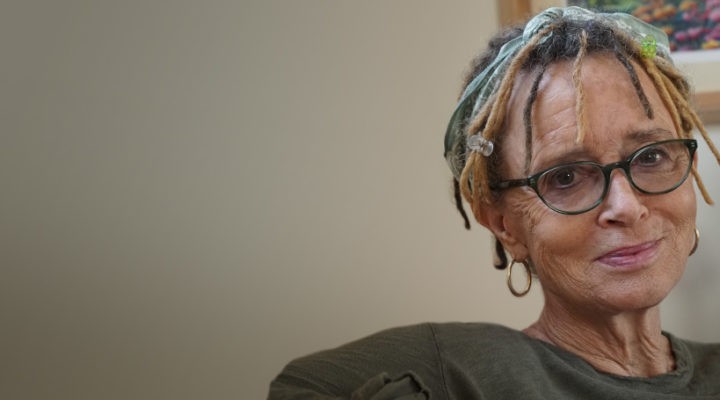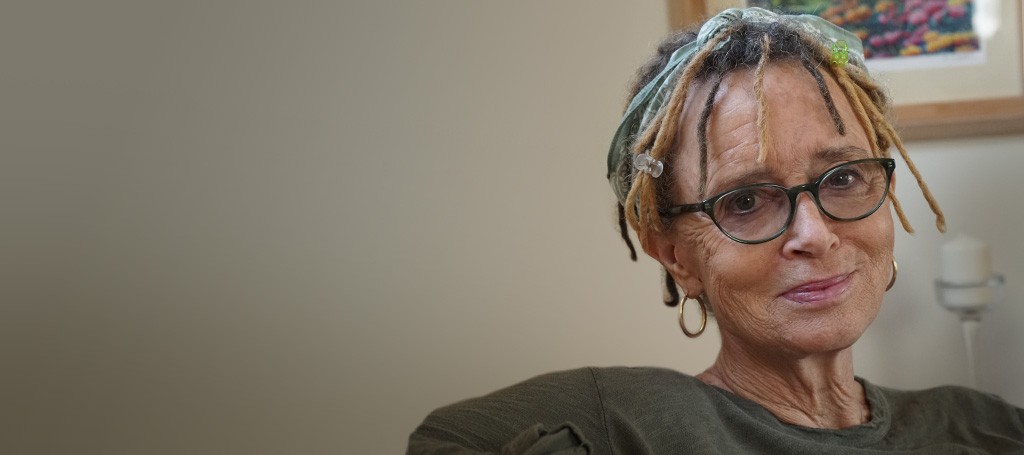I recently sat down with Anne Lamott, beloved and debated American novelist and non-fiction writer, to discuss her new release, Dusk Night Dawn.
This book has all the trademarks that make Lamott a household name and New York Times best-selling author: Empathy, provocative thought and inspired soul searching. In this new release, she reflects on the need for courage. Courage is something she fully embraces and asks her readers to do the same — all in her down-to-earth folksy style.
 As our conversation began, Lamott was on a tight schedule to connect with a friend she hadn’t seen since the start of the pandemic. However, she made it clear that if we didn’t get enough time today, we could connect in the future. She’s so human in that regard.
As our conversation began, Lamott was on a tight schedule to connect with a friend she hadn’t seen since the start of the pandemic. However, she made it clear that if we didn’t get enough time today, we could connect in the future. She’s so human in that regard.
“I decided to think of the pandemic as COVID college, and what are some of the greatest teachings that I needed to learn from it,” she explained.
Learning is what Lamott seems to like to do best. And her learning comes with a posture of welcoming change and being open to what God brings her way.
“I’ve watched kids in my Sunday school class that I lead become free of addiction along with watching my son stay sober for the last nine years,” she said. “I’ve learned in my life that God always makes a way out of no way.”
Lamott speaks from an understanding that God has a way of making the best out of things no matter the situation. This understanding inspires her writing and mission in life — to point people to God.
It may surprise some to learn that this well-known author teaches a Sunday school class at an interracial church with fewer than 50 attendees. She invited me to attend her virtual class. I’m glad I accepted her invitation.
Lamott has a manner of speaking and writing that makes people sit up, listen and react. Within her virtual class, she seems pretty normal like the rest of us. She sits and takes notes and chats in the comment section. Having had the privilege of attending her class twice, it’s an amazing sight to see this best-selling author at church and singing, at times, old Negro spiritual songs.
“I’m a passionate, devout Christian. It’s just that I’m not a fundamentalist.”
She explained: “I’m a passionate, devout Christian. It’s just that I’m not a fundamentalist. The political Christians tend to be very, very much more fundamentalists, let’s say.”
Lamott believes God has called her to an existence that is hardly that of a fundamentalist Christian. Her joy seems to come through carrying out the work of Christ on earth — with people.
“Jesus’ message for me is that you give thirsty people water,” she said. “Being a servant of Christ is serving others.”
It is ‘serving others’ that moves Lamott to action. “During COVID, we saw lines two and three miles long of people in cars trying to get a box of food for their kids. I believe Jesus weeps over these types of things.”
Carrying out her Christian calling not only moves her personally, it also gives her strength for her writing and telling stories that matter to many.
In her latest book, Lamott writes about the interactions she has with her students. Many of the kids in her class come from families that live in dysfunctional, under-resourced communities. She seems to have a passion for those who live within that type of lifestyle.
“I try to keep my mission in living out the gospel simple.”
“I try to keep my mission in living out the gospel simple,” she said. “Kids have always loved and trusted me for some reason. It’s just how the Lord made me in relating to kids; they can tell me anything, and I won’t judge them.”
Lamott comes across more like a youth pastor than a best-selling author.
“I won’t tell them what I think they should do,” she explained. “I will listen, and my heart will be open to their struggle.”
Having wrestled with addiction herself, Lamott has an infectious degree of empathy and understanding. “Some of my Sunday school girls have been cutters. You know, their wrists are slit with razor lines, and some of my kids have ended their life.”
She laments the struggle she has seen in her class members’ lives. It is not merely “a moment” for her. She digs into the humanity of the members of her class. She pauses to make sure we don’t quickly pass over what she’s just shared.
“I look at the lost. We have a youth group in heaven.”
“I look at the lost. We have a youth group in heaven,” she added. And from this lament, she understands the realness and truth of the circumstances some of the kids face. From there, she dives into her calling and mission to be a solution-solver, which is how she lives out her faith.
In living out that faith, Lamott knows one of the things she does best is writing for the masses, but the time with those in her Sunday school class seems to allow her to connect intimately with people and help them understand their calling and mission.
“I try to help my kids be really curious about faith,” she said, and yet these young friends also give her insight and material to weave into her writing.
“If you read the chapter in Dusk Night Dawn about what a soul is, the answers that my students gave me are the most beautiful definitions,” she said. “Putting aside C.S. Lewis or any of them. I’ve heard from my class (that a soul is) a silvery snow globe. The deepest part of you. A little peek at you. Love is in the very heart of you. It’s a little person. A little kitty-bunny person looking out into the world with love and curiosity.”
As Lamott recounts this portion of the book, it is obvious this mission of being a Sunday school teacher ignites her passion for storytelling to people who may never attend one of her classes, but perhaps they are by reading one of her books.
“I am doing my very best to transform my stories, my very ordinary stories, into medicine for whoever my readers might be.”
When asked if she is surprised to be a successful writer, she said: “This is my 19th book. I’ve been doing this professionally for 45-years, and when I sit down to write, I’m never in the mood. I don’t wait for inspiration. My dad was a writer. He taught me that you sit down at the same time every day. You do it as a habit. You do it by prearrangement with yourself as a debt of honor. Because no one cares if you write, no one cares. I’m never in the mood to write, to tell you the truth, but you know what? If I’ve gotten a couple of hours of work done, I’m going to have a much, much better day because I’m going to know that I met something that was a gift that was given to me. I am doing my very best to transform my stories, my very ordinary stories, into medicine for whoever my readers might be.”
It’s this medicine — the missional ministry of Lamott’s writing — that is working for many.
I’ve had the privilege of interviewing many influential leaders. Most of them have been great. But none of them have prayed for me the way that Anne Lamott did.
As our conversation closed, she prayed. “Thank you for my new friend. I pray courage for him to step into the shape that awaits both of us, always, always in your precious name, Lord; I pray that you make us ever mindful of the needs of the poor. Amen”
Amen indeed, Anne.
Maina Mwaura is a freelance religion writer and communications consultant based in Atlanta.


